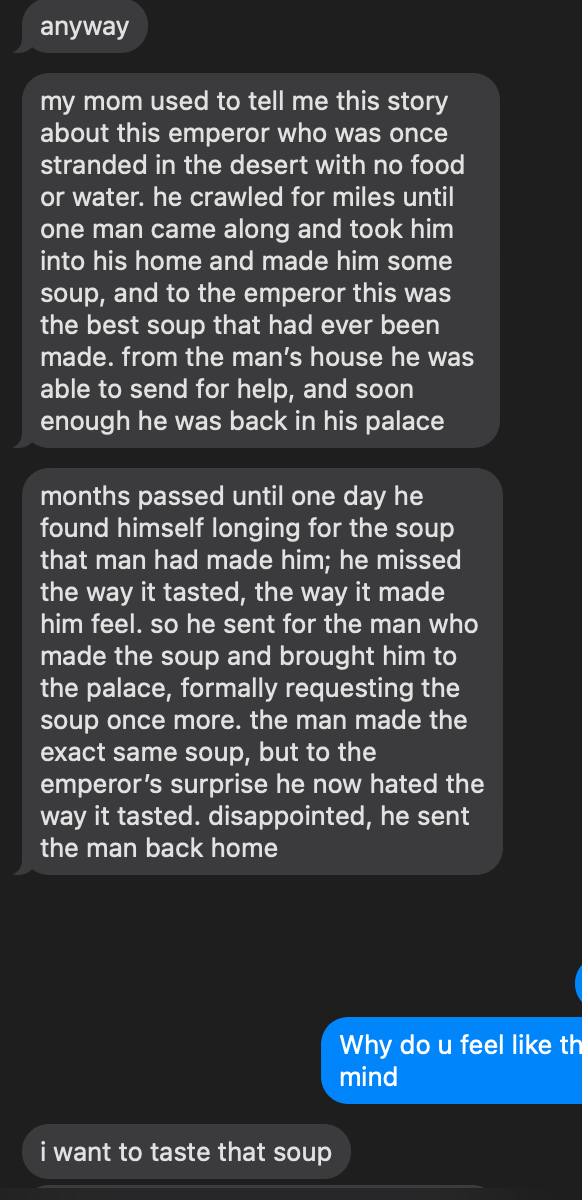Text:
Chinese Characters (Simplified and Traditional): 柳暗花明又一村
Romanization: Liǔ’ànhuāmíng yòu yī cūn
Transliteration: Willow – Dark – Flower – Bright – Another – Village
Smoother Transliteration: past dark willows and flowers in bloom lies another village [via Source 1 listed at the bottom]
Free Translation: A solution lies at the end of the tunnel.
Context:
Me: When would you hear this or when would you say it?
Informant: so usually when we have a difficult time, and but somehow all of sudden, you have a hard moment, is all of sudden you have a solution for it. so uh so and uh that’s pretty much it. I-i-i like it is just because um there are no problems or no difficulties cannot be like cannot be solved, but sometime there is a time period you are searching and you are just not find it, right? but you keep searching, and then at a moment, you find a solution. So that’s we say 柳暗花明又一村.
Uhh so liu means the trees, I think liu shu, how to say in English. Is uh, is willow. Willow so have like long strips of those things, willow. An is just dark, but then you’ll see flowers. Hua is flowers, ming is just bright, uhh so then you you yi cun is another I mean, basically you see the flowers in another village. Something like that. So you discover things.
Q: Where did you first hear this? Who first said this to you?
A: Can be my teacher. or, could be friends, they are naturally very optimism people, they are just very positive people, so so when we are searching and in the dark and find something, sometimes they they also encourage you, say 柳暗花明又一村 you’re going to find something
Q: Who usually says this?
A: People who are working together trying to find a problem, usually I’m just I just get excited 柳暗花明又一村 say something like that.
Me: Do you know the origin?
Informant: Yeah, it is, so there is, this is from a Poem from Song dai (Song dynasty) a poem. And uh, so, in his poem, that’s one sentence. Just said when you have a difficult time, if this method does not work, you try different method, and you through trial and error search to find the solution.
Personal Thoughts:
This particular proverb is interesting because it finds its origins in authored literature. It is important to note, however, that many sayings and proverbs in Chinese have written origins, or at least accompanying stories. Alas, having a written origin is not necessarily enough to disqualify something from being folklore. The fact that this one line is being used in every day situations centuries later, separate from its original work or even the name of the poet, has shifted this work from purely written to more folkloric. This saying is also interesting because its literal meaning is drastically different than its free translation.
Additional Notes:
For translations of this one particular saying:
[1] 山穷水尽疑无路,柳暗花明又一村的英文. 查查在线翻译. (n.d.). Retrieved April 27, 2022, from http://www.ichacha.net/%E5%B1%B1%E7%A9%B7%E6%B0%B4%E5%B0%BD%E7%96%91%E6%97%A0%E8%B7%AF%EF%BC%8C%E6%9F%B3%E6%9A%97%E8%8A%B1%E6%98%8E%E5%8F%88%E4%B8%80%E6%9D%91.html
For the full poem referenced:
山重水复疑无路,柳暗花明又一村_百度百科. 百度百科. (n.d.). Retrieved April 27, 2022, from https://wapbaike.baidu.com/item/%E5%B1%B1%E9%87%8D%E6%B0%B4%E5%A4%8D%E7%96%91%E6%97%A0%E8%B7%AF%EF%BC%8C%E6%9F%B3%E6%9A%97%E8%8A%B1%E6%98%8E%E5%8F%88%E4%B8%80%E6%9D%91/3576938

